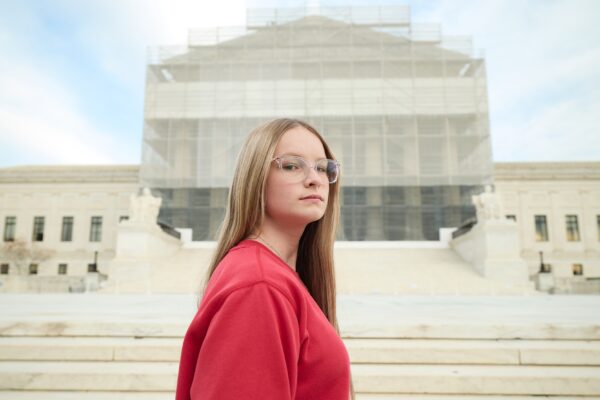Kansas Public Library Concedes That it Can't Censor Employee for Discussing Historic Sodomy Ruling
FOR IMMEDIATE RELEASE
TOPEKA, KS - Responding to a letter from the American Civil Liberties Union, the Topeka and Shawnee County Public Library has conceded that, under the law, it cannot forbid one of its employees from talking at work about the recent historic Supreme Court ruling banning sodomy laws.
""To a large number of Americans, the Court's decision in Lawrence v. Texas was a shining moment in our history because it's another giant step toward equality for all Americans,"" said Dick Kurtenbach, Executive Director of the ACLU of Kansas and Western Missouri. ""We've made certain that the public library understands that it cannot strip Bonnie Cuevas of her constitutional right to free speech by prohibiting her from ever talking about this important development at work.""
On the day after the ruling, Bonnie Cuevas, a longtime Topeka activist and member of Parents, Families, and Friends of Lesbians and Gays (PFLAG), was ordered by two library managers to never again discuss at work the decision and its impact on her family. The ACLU sent a letter to the library's director, pointing out that such an order violates Cuevas's First Amendment right to free speech, and the library's attorneys have now responded that the library will not restrict Cuevas or any other employee this way in the future.
""When the Supreme Court struck down sodomy laws, it was an incredibly significant moment for my family,"" said Cuevas, the mother of a gay son who was the victim of an anti-gay hate crime. ""Ordering me not to talk about a social issue like this at such a crucial time in history seems to me to be completely contrary to the ideals and principles that public libraries should exemplify.""
On June 26, the day of the Lawrence v. Texas decision, Cuevas was approached by one or two co-workers and received a few short, unsolicited calls from friends who wanted to share their excitement over the decision with her. The next day, Cuevas received one more short call from a friend about the decision. Not long after that, two library managers told her that a co-worker had complained that Cuevas was creating a ""hostile work environment"" instructed her never to speak about Lawrence v. Texas at work again. She was the only library staff member to be placed under such a restriction.
""Bonnie Cuevas has once again proven herself to be a tireless advocate for civil rights,"" said Pedro Irigonegaray of Irigonegaray & Associates, who worked with the ACLU to represent Cuevas. ""She knew her employer couldn't censor her speech at work on such an important issue, and she should be commended for standing up to the library for trying to stomp on her First Amendment rights.""
Under the law, public employees - such as people who work at public libraries or for the government - may discuss matters of public concern at the workplace as long as that speech doesn't interfere with the employees' ability to do their jobs, the ACLU said.
""Everyone who supports the rights of gay people needs to speak out and work to make gay people truly equal,"" said Ken Choe, a staff attorney with the ACLU's Lesbian and Gay Rights Project. ""The Supreme Court has given local activists an amazing opportunity to work for true equality in their communities, and we hope that people will take advantage of this chance to make meaningful and lasting change.""
The ACLU has developed a new website, www.aclu.org/getequal, that is designed to help lesbian, gay, bisexual, and transgendered people and their supporters take advantage of this unique opportunity. The advocacy materials on the site are designed so that even those most strapped for time can make a difference. Suggested activities range from a one-click action alert to members of Congress opposing the anti-gay relationship amendment to comprehensive instructions on how to organize campaigns to change local laws. The materials at /getequal, focus on three critical issues facing LGBT people: (1) protections against discrimination in the workplace, housing and public accommodations, (2) making schools safer for LGBT students, and (3) getting equality for LGBT relationships.

